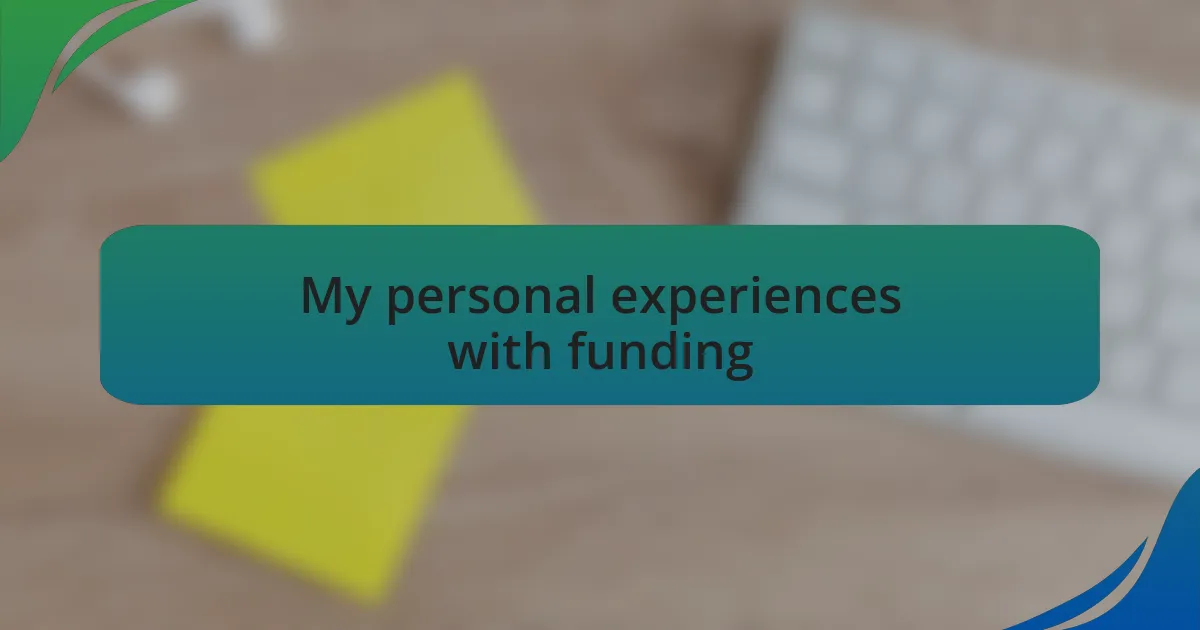Key takeaways:
- Alternative funding methods like crowdfunding and peer-to-peer lending offer flexibility and quicker access to capital compared to traditional bank loans.
- Funding is essential for SMEs to grow, innovate, and maintain competitiveness, allowing them to invest in technology and talent.
- Angel investors not only provide capital but also mentorship and networking opportunities that can significantly benefit small businesses.
- Personal experiences with funding highlight the importance of resilience, preparation, and adaptability in navigating the financing landscape.

Understanding alternative funding methods
Alternative funding methods have become a lifeline for many small and medium enterprises (SMEs) seeking financial support. From my experience, these options often provide a more flexible approach compared to traditional bank loans. Have you ever felt frustrated by the lengthy approval processes of banks? If so, you’re not alone; many entrepreneurs crave the immediacy that alternative methods can offer.
One popular option is crowdfunding, where you pitch your business idea to the public for small contributions. I remember a friend who turned to this method when launching her startup; the excitement of having a community rally behind her was incredible. It’s fascinating how this funding approach can not only raise capital but also build a loyal customer base even before your product hits the market.
Peer-to-peer lending is another avenue worth exploring. This method connects borrowers directly with individual lenders, often resulting in lower interest rates than traditional loans. I’ve seen SMEs thrive when they tap into this resource, finding that personal touch in the lending process can be quite motivating. When you share your story with a potential lender, it creates a compelling connection that mere numbers on a spreadsheet can’t replicate.

Importance of funding for SMEs
Funding is crucial for SMEs, as it directly impacts their ability to grow and innovate. Without adequate financial resources, even the most promising ideas can falter. I recall a time when my own venture faced cash flow issues; it was nerve-wracking to watch potential opportunities slip away simply due to a lack of funding.
Moreover, access to funding enables SMEs to invest in key areas such as technology and talent. I once spoke with a small business owner who secured funding right when he needed to upgrade his outdated systems. That investment not only improved efficiency but also led to increased customer satisfaction, illustrating how vital funding can be for maintaining competitiveness in the market.
Lastly, funding empowers SMEs to take calculated risks. It’s understandable to feel afraid of stepping out of your comfort zone without financial backing, but I’ve witnessed firsthand how strategic investments can lead to exponential growth. Have you ever hesitated to launch a new product because of budget concerns? By securing the right funding, you can confidently explore innovative avenues that can set your business apart.

Common types of alternative funding
When discussing common types of alternative funding, one method that frequently comes to mind is crowdfunding. I remember when I decided to fund a creative project through a crowdfunding platform; the thrill of seeing community support pouring in was incredible. Crowdfunding allows individuals and businesses to raise small amounts of money from a large number of people, making it an accessible option for many SMEs looking to launch innovative products without traditional bank loans.
Another popular approach is peer-to-peer lending, which connects borrowers directly with individual lenders through online platforms. I’ve seen some entrepreneurs leverage this method successfully, often citing lower interest rates compared to conventional bank loans. It emphasizes the personal connection in financing; after all, isn’t it reassuring to know that someone out there believes in your vision enough to back you financially?
Lastly, angel investors represent a vital funding source for many small businesses. These affluent individuals not only provide capital but often come with invaluable mentorship and networking opportunities. I recall meeting an angel investor at a networking event who shared insights that transformed my business strategy. Isn’t it inspiring to think that securing funds can also open doors to guidance and experience that can lead to substantial growth?

My personal experiences with funding
I remember my first experience with applying for a traditional business loan—it was daunting. The paperwork seemed endless, and I often found myself questioning whether I had what it took to convince the bank of my vision. After weeks of waiting, hearing that I was approved filled me with relief and excitement; it was a pivotal moment that taught me the value of resilience and preparation in securing funding.
On another occasion, I ventured into the realm of bootstrapping, relying purely on personal savings and sales revenue to grow my business. It felt incredibly empowering to fund my venture without outside help, but there were moments of uncertainty when cash flow was tight. I often wondered if I could sustain this approach long-term, yet the sense of ownership and independence it provided was worth the challenges I faced along the way.
Seeking venture capital was a different beast entirely. During my pitch meetings, I felt the pressure and exhilaration of sharing my passion, hoping to ignite interest in potential investors. Although not every meeting led to funding, the feedback I received was invaluable, pushing me to refine my business model and articulate my vision more clearly. Isn’t it fascinating how every funding journey can teach us something, regardless of the outcome?